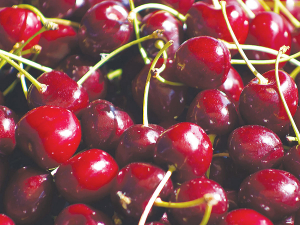Cherry on top – exports reach record levels
New Zealand cherry exports may be headed for a record year in terms of volume, says Summerfruit NZ chief executive Dean Smith.
 The cherry season is quite short, with early varieties ripening in late December and all finished by early February.
The cherry season is quite short, with early varieties ripening in late December and all finished by early February.
The cherry season is quite short, with early varieties ripening in late December and all finished by early February.
The delicate stone fruit are not easy to grow, requiring extensive bird protection, and cherries are labour intensive to pick and process.
After picking, cherries are washed at pack houses and exported or distributed around the country, either as fresh or frozen product. The comparison between fresh and packaged fruit found processing had varying effects on the nutrients and bioactive compounds of the fruit.
“We found only some minor differences and little effect from the time and the process of washing, drying and packing,” Dr Ali Rashidinejad adds. “It’s good news that the transport and packing does not have a major effect on the health-promoting compounds.”
He believes the findings were exciting for the future opportunities that could be explored.
“This has been a comprehensive study. The hypotheses have been confirmed that New Zealand cherries are a great source of antioxidants and nutrients, and that the processing has a little or no impact on their nutritional properties.”
He says future steps would be finding ways to use the waste products produced during cherry processing. It has been estimated that 8000 tonnes of cherry waste are produced in New Zealand every year.
Because washing and packaging does not significantly reduce the nutrient profile of the fruit, this could lead to new uses for the waste or the seconds that don’t get to shop shelves.
Such waste from cherries could be converted into a high-value ingredient for the food industry in the future. This could be in powdered or frozen form, or as a component in another food product.
Mating wrapped up last month at the across-breed Beef Progeny Test on Pāmu’s Kepler Farm in Manapouri.
Libby Judson is a keeper of memories from an age gone by. Tim Fulton tells her story.
A New Zealand-first native tree study has highlighted the Bioeconomy Science Institute's position as a forestry research leader.
Hemp fibre processor Rubisco is relocating its core processing facility to Ashburton as part of a $20-$30 million expansion to leverage what it says is an accelerating global demand for sustainable and renewable fibres.
Tradition meets some of the latest in technology at the 2026 East Coast Farming Expo.
OPINION: Trade Minister Todd McClay and the trade negotiator in government have presented Kiwis with an amazing gift for 2026 - a long awaited and critical free trade deal with India.